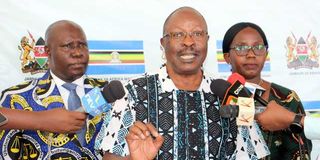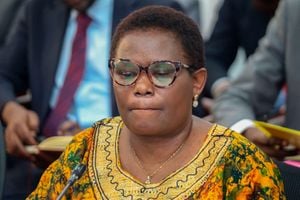Bittersweet taste of language: Embracing cultural identity

From left: East African Court of Justice president Justice Nestor Kayobera, Twaweza Communications CEO Kimani Njogu and East African Community Executive Secretary Dr Croline Asiimwe address the press during the third celebration of World Swahili Day and the second international conference of the East African Swahili Commission at Sarova Whitesands in Mombasa.
In Joseph Conrad’s most heartrending short story, Amy Foster, a young man named Yanko Goorall from Eastern Europe is shipwrecked off the English coast on his way to America. He moves to a nearby village, but he speaks no English.
With a general sense of estrangement, Yanko is isolated and forlorn. He is given shelter and employment by an eccentric old local and later gets married to the simple Amy Foster.
Strange language
The great literary critic Edward Said once wrote about Yanko that, “the man remains a foreigner, never learns the language, and even after he and Amy have a child cannot become a part of the very family he has created with her. When he is near death and babbling deliriously in a strange language, Amy snatches their child from him, abandoning him to his final sorrow”.
The next morning Yanko dies of heart failure. It emerges that in his dying hour, Yanko had simply been asking for water but in his native language that no one could understand. It seems that in their dying hour, especially when delirious, some people go back to their default (“go home”) — to the “language of the heart and of nostalgia”.
I was reminded of this as I thought about the role of Kiswahili on July 5, 2024, which was the World Kiswahili Language Day. UNESCO writes that “Kiswahili is one of the most widely used languages of the African family, and the most widely spoken in sub-Saharan Africa. It is among the 10 most widely spoken languages in the world, with more than 230 million speakers”.
As seen in the character Yanko, language is important in establishing human communication and empathy. The writer of Amy Foster, Joseph Conrad, knew the importance of culture and language and the story he wrote about Yanko mirrors his own life as he was Polish but lived in England. In his book, Joseph Conrad: A Life, the biographer Zdzisław Najder writes that, “Like Yanko, Conrad is a foreigner living in England, far from his native land; the pivotal scene of Amy being scared by the fevered Yanko is based on an incident during Conrad’s 1896 honeymoon in France when, in a fevered delirium, he reverted to his native Polish, frightening his wife Jessie”. Edward Said aptly wrote that, “It is difficult to read ‘Amy Foster’ without thinking that Conrad must have feared dying a similar death, inconsolable, alone, talking away in a language no one could understand”.
Language of the heart
“Talking away in a language no one could understand” is frightening. Thanks to Kiswahili, millions of people can now communicate in Kiswahili and it has become a “language of the heart and of nostalgia”
— the language one resorts to when babbling like Yanko in a delirious state. This turning to one’s language of the heart is what the American-based English critic James Wood calls “going home”. Wood writes that, “I once saw, in Germany, a small exhibition of Samuel Beckett’s correspondence with his German publisher. Many brief note-cards were arranged chronologically, the last written only a few months before his death. Beckett wrote to his publisher not in German but in French, a language in which he was deeply at home; but in the final year of his life, he switched to English. ‘Going home,’ I thought”.
The Zanzibari writer Mohammed Ghassani takes this “going home” stance in his poetry collection, N'na Kwetu: Sauti ya Mgeni Ugenini (I Have a Home: The Voice of a Stranger in a Strange Land”). Having left Zanzibar many years ago and now living in Germany, Ghassani is like a present-day Joseph Conrad, missing the simplicity of his homeland and he writes about it in melodious Swahili — in the sliding rhythms of the language, the elongated last syllables of words, the slippery vowels and the clipped consonants — everything as soothing as listening to bees humming in the African Savannah. Ghassani writes: “Ni mtumwa msikwao, nami katu huyo siye… n’na kwetu hasa mie, n’nako kwa mazalio, kwa makuzi na mavae… Lau twapangwa mafungu, uijue hesabuye, waitwa Wazanzibar… basi ninganumanuma miji na nchi za watu… wasidhani ni mtumwa, mie ni mtu na kwetu, jina kwetwa Zanzibar” (It is a slave who has no home, and I am not like… I have a home I belong to, I have a place with specific upbringing and dress code… even though we are being sold for a price, know your worth Zanzibaris… even though I wander up and down the streets of other cities and other people’s countries… they should not think I am a slave, I have a home I belong to/the place is called Zanzibar).
From all the stories on the importance of language from Conrad and his character Yanko to Samuel Beckett to Mohammed Ghassani, a language like Kiswahili has several important roles from saving lives in medical emergencies, enabling human communication to conveying culture: in learning a language, one goes beyond just learning vocabulary and phrases to learning a culture’s rituals, history, values, beliefs, behaviours, and rules that a group of people share. In Kenya and much of sub-Saharan Africa, we are lucky to have the Swahili language that can unite us and also help us do business together using a common language. Kiswahili kitukuzwe (May Kiswahili take a prime position).
The writer is a book publisher based in Nairobi. johnmwazemba@gmail.com





